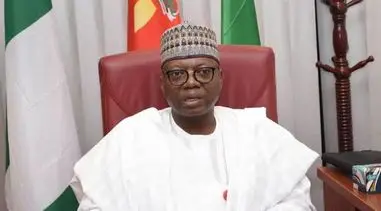The Nigeria Insurance Industry Reform Bill, 2024 (SB 393) scaled second reading at the Senate on Thursday.
The bill was Sponsored by the Chairman, Senate Committee on Banking, Insurance and other Financial Institutions, Senator Mukhail Adetokunbo Abiru, (Lagos East), and 41 other Senators.
Senator Abiru, in his lead debate, addressed the Senate on the general principles of the bill that seeks to provide a comprehensive legal framework for the regulation and supervision of all manner of insurance businesses in Nigeria.

Speaking on the bill, Senator Abiru decried the low penetration of insurance services in Nigeria, despite being one of the oldest industries in the nation’s financial services sector. He put the penetration rate at 0.5%, ranking 70th globally and 5th in Africa.
Abiru, an accomplished economist and accountant, who retired as a bank Chief Executive, argued further that, “With its young and vibrant population and growing GDP, the potential for exponential growth is undeniable. However, to truly thrive in the next decade, the industry must reform in order to take advantage of the opportunities and contribute to economic growth in the country”.
In reference to the extant laws that regulate the practices of various insurance businesses, like the Insurance Act, 2003, the Marine Insurance Act, Motor Vehicles (Third Party Insurance) Act, National Insurance Corporation of Nigeria Act, and Nigeria Reinsurance Corporation Act, these laws, according to Senator Abiru, have become obsolete and ineffective in the wake of innovations and dynamics that have characterized the practices of insurance in recent time.
“All these legislations, having surpassed a two-decade mark, lack provisions that can adequately address contemporary challenges and support growth & innovations within the industry. This legal obsolescence has led to some level of regulatory inefficiencies in the insurance industry.
“This has also hampered the industry’s ability to successfully compete on a global level, underscoring the necessity of a thorough assessment and update to improve international competitiveness of Nigeria’s insurance industry”, Senator Abiru submitted in his lead debate.
He highlighted the specific objectives of the bill and the general benefits to Nigerians, and the economy. The bill consolidates various existing pieces of legislation regulating the conduct of insurance businesses in Nigeria such as the Insurance Act, 2003 the Marine Insurance Act, Motor Vehicles (Third Party Insurance) Act, National Insurance Corporation of Nigeria Act, and Nigeria Reinsurance Corporation Act.
The bill therefore seeks to provide a robust legal and regulatory framework that will ensure that the Insurance sector contributes positively to the principal objective of the Financial System Strategy to make Nigeria Africa’s financial hub and one (1) of the twenty (20) largest economies in the world; Evolve effective risk based supervision, in the regulatory system as the existing rule based supervision, enabled by the current laws has become obsolete; Fast track the process of managing weak companies as the existing legislation is not efficient for effective distress management; Review the penalties as the ones prescribed in the existing laws are inadequate and not deterrent enough.
Other objectives included, the need to ensure ethical practice and international best practices as required by the International Association of Insurance Supervisors(IAIS), and the need for a legal and regulatory framework that allows the supervisory authority to deal promptly with issues evolving from the dynamism of the insurance business.
The Senators unanimously commended Senator Abiru, and 41 other co-sponsors for coming up with a well-researched and critical bill that will revolutionize the insurance sector in Nigeria.




